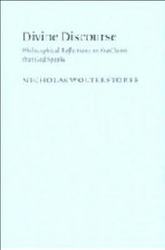Description
The book "Divine Discourse" by Nicholas Wolterstorff explores the philosophical implications of the claim that God speaks, which is a central belief in Judaism, Christianity, and Islam. The author argues that there has been a lack of philosophical reflection on this claim due to a misunderstanding of divine speech as divine revelation. Using speech-action theory, the author concludes that the claim of God speaking is coherent and does not contradict any obvious truths. The book also delves into the interpretation of texts to understand what God is saying, addressing issues such as the legitimacy of interpreting an author's words and the double hermeneutic involved in appropriation of discourse. The book ends with a discussion on the epistemological question of whether we can believe that God speaks.
Divine discourse comprises Nicholas Wolterstorff's philosophical reflections on the claim that God speaks. This claim figures large in the canonical texts and traditions of Judaism, Christianity, and Islam, but there has been remarkably little philosophical reflection on it, in good measure (so Professor Wolterstorff argues) because philosophers have mistakenly assimilated divine speech to divine revelation. He embraces contemporary speech-action theory as his basic approach to language; and after expanding the theory beyond its usual applications, concludes that the claim that God performs illocutionary actions is coherent and entails no obvious falsehoods. Moving on to issues of interpretation, he considers how one would interpret a text if one wanted to find out what God was saying thereby. Prominent features of this part of the discussion are his defense, against Ricoeur and Derrida, of the legitimacy of interpreting a text to find out what its author said, and his analysis of the double hermeneutic involved when the discourse of one person is appropriated into the discourse of another person. The book closes with a discussion of the epistemological question of whether we are entitled to believe that God speaks.
